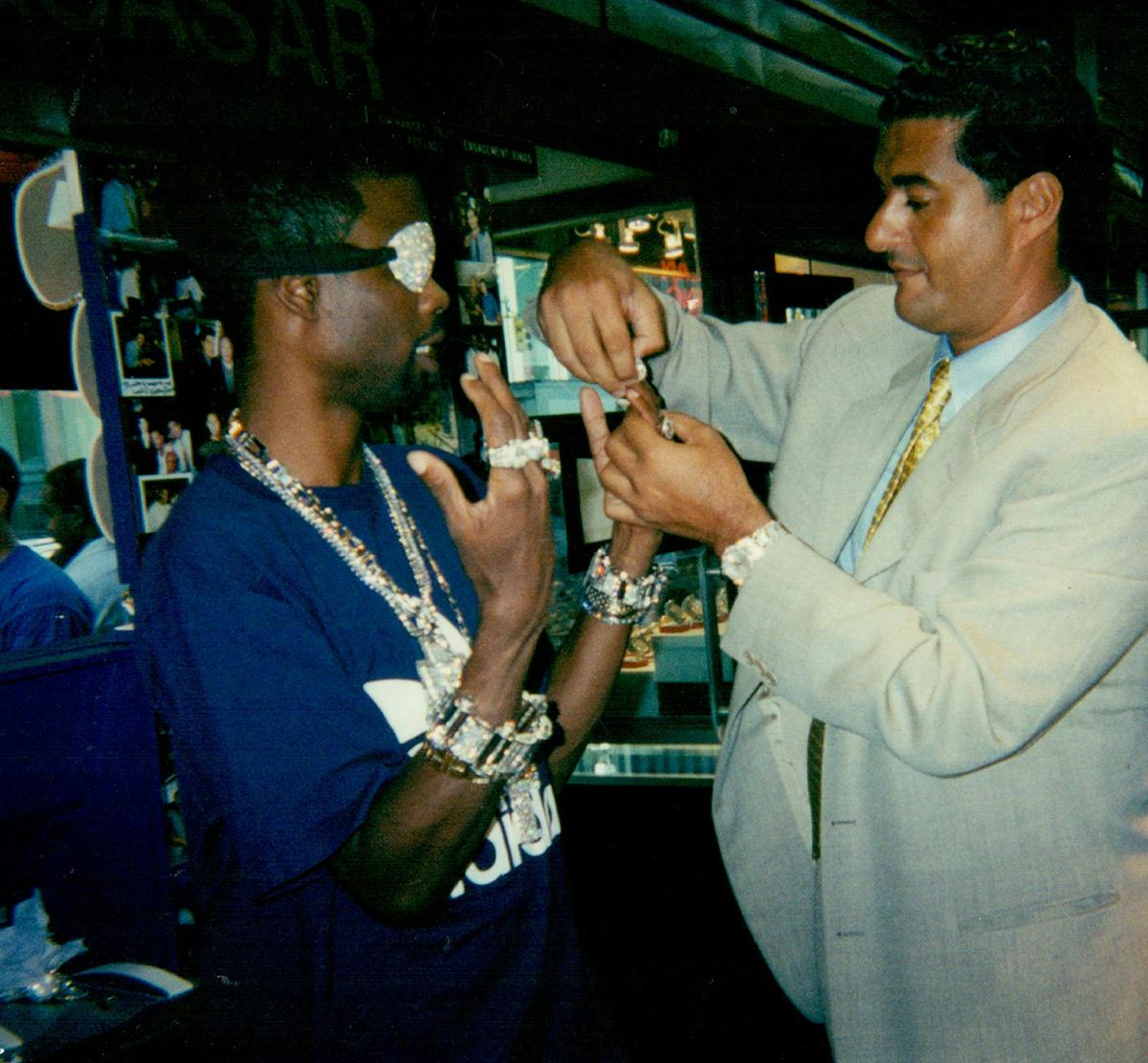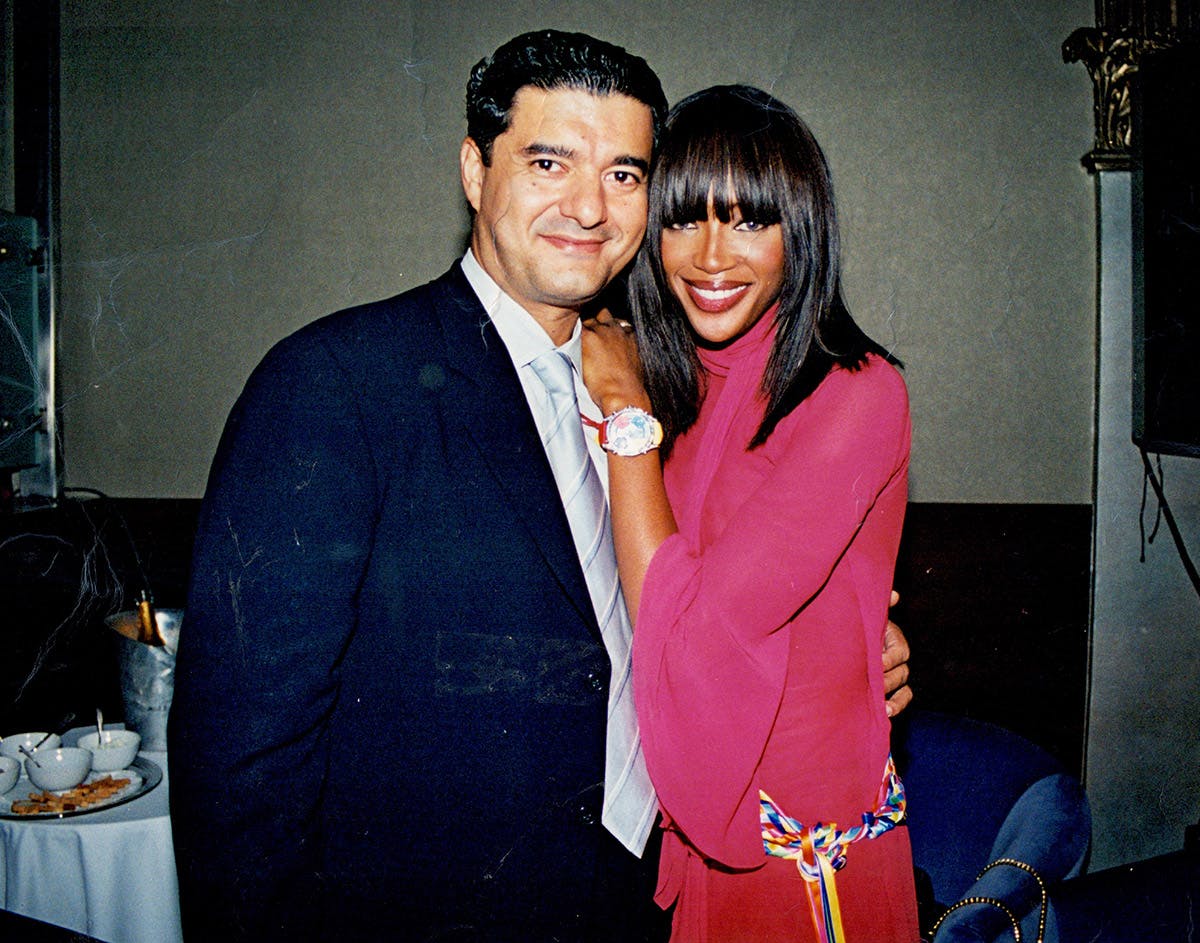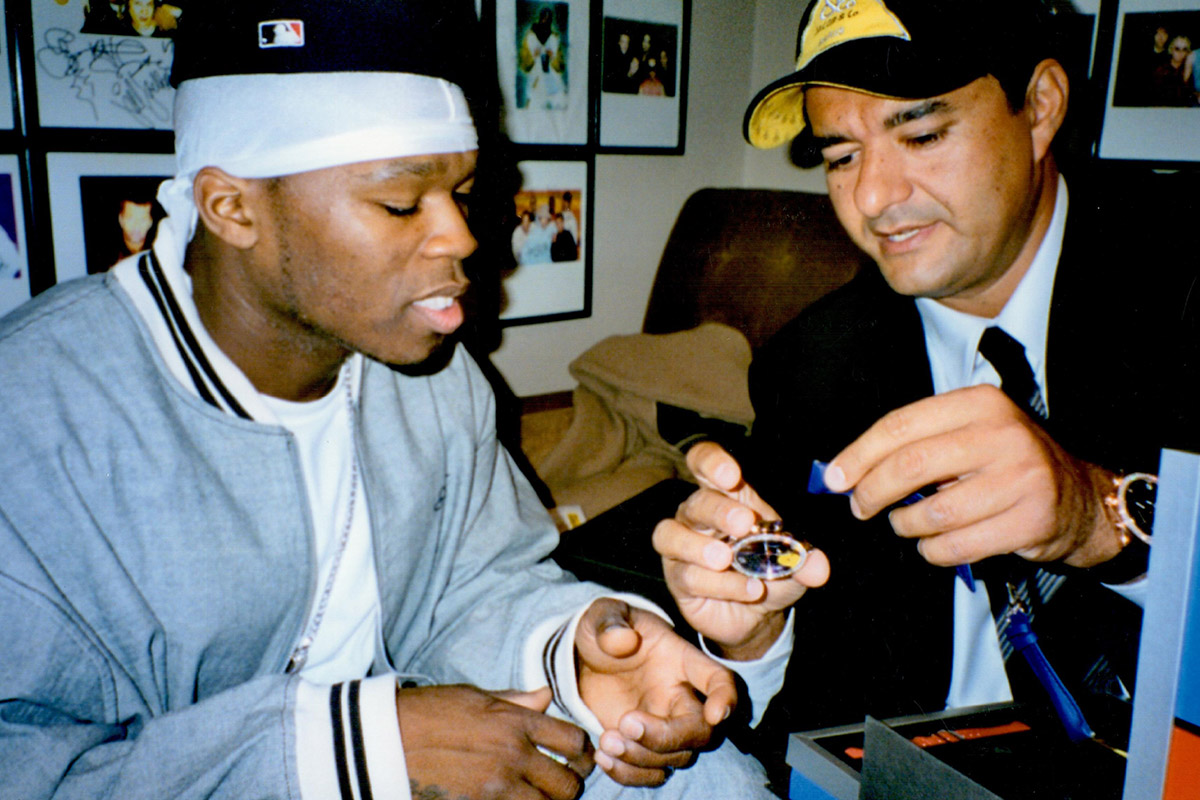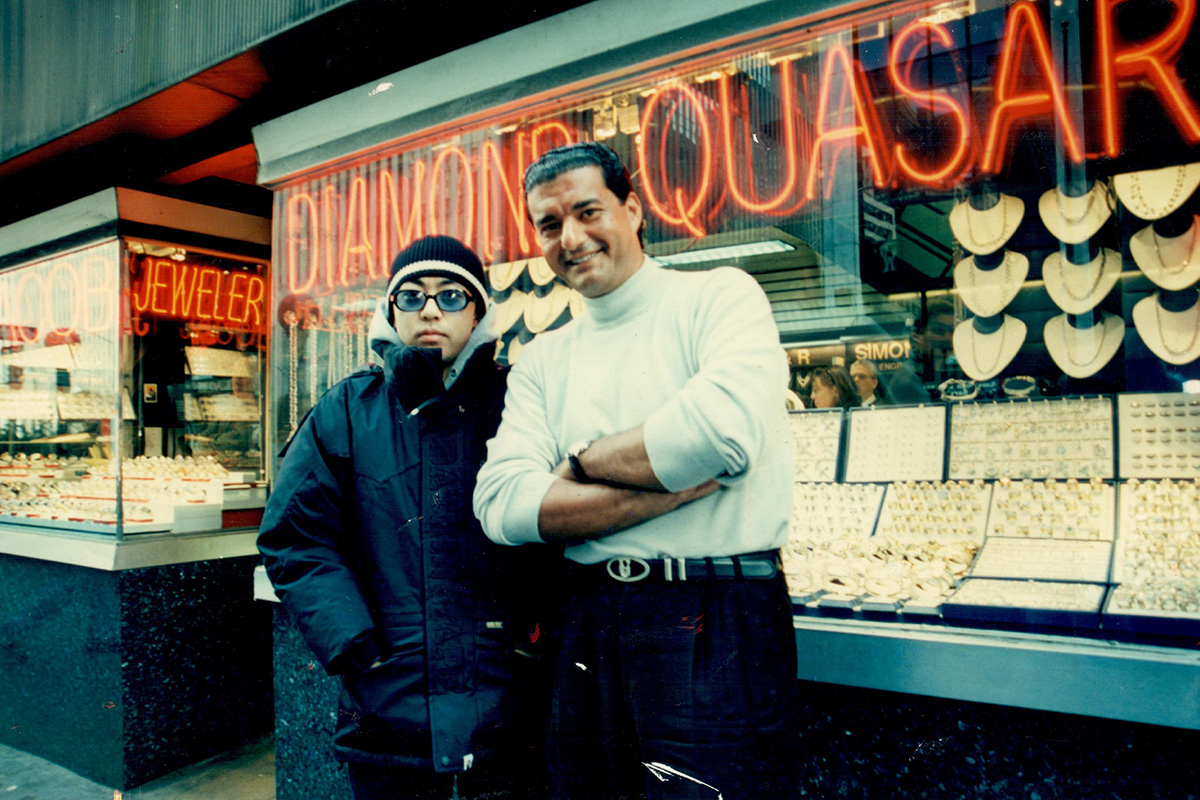This week’s FRONTPAGE dives into the history of Jacob Arabo, an émigré from Soviet Uzbekistan who conquered the New York Diamond District. Through his legendary company Jacob & Co., he has become synonymous with excellence in jewelry and has earned his credentials as the jeweler to the stars infinite times over.


Jacob Arabo, founder of the watch and jewelry company Jacob & Co., doesn’t see what we see. Gazing from the window of his Midtown Manhattan office, one would imagine that he pictures objects covered in jewels and pendants first, before fading back to our monochrome reality. Buildings, trains, hearts, oil derricks: these are just some of the forms he takes and turns into his diamond-riddled designs. His watches might appear to be more the product of a Gen Z galaxy brain than a 56-year-old man born in Soviet Uzbekistan, one known by the world’s most famous rappers and celebrities as “Jacob the Jeweler.”
Arabo and his company are responsible for many cultural artifacts we now take for granted, perhaps even the idea of “bling” itself. From his Five Time Zone watch to the Heart to Heart watch, wearing a piece of jewelry made by Arabo was, from the ’90s onward, the ultimate form of flossing. Even today, when a rapper wears an iced-out Bart Simpson pendant, they have Arabo to thank, at least in part, for bringing ice to where it is today.


Born in 1965 in the Uzbek capital Tashkent, Arabo emigrated to the US as a teenager. His childhood in the industrial Central Asian USSR influenced him to go in the creative direction he did, trading starkness for opulence. “It wasn’t easy to live in the Soviet Union,” Arabo tells me at his Manhattan office overlooking 57th Street. “Everything had to be the same. Everyone had the same furniture, the same shoes. But experiences like that open your eyes to different lifestyles, different countries, different laws. It means that I’m comfortable no matter where I am. I may have only been 14 years old, but I knew exactly what was going on.”
Instead of shying away from this history, Arabo wears it as a badge of pride. He opens the safe next to his desk and pulls out a watch that his father gave him when he was 13. It’s a simple gold-plated timepiece with hands that sit on top of a map of the world. In a way, it doesn’t look dissimilar to his Five Time Zone watch, which featured the time zones of five separate locations splayed across its face.
Way before he started advertising, Jacob’s success was just word of mouth and relationships. The combination of him having the relationship with Jay-Z, Puff, myself, NBA players, models, and then also a lot of his community in Europe and in Russia and in the Middle East, it just created this cache that can’t be duplicated. He has friends in high places, but he was never too good to have friends in the low places.
Pharrell Williams
Maybe his humble origin story is part of the reason rappers flocked to see Arabo so persistently over the years. For the likes of The Notorious B.I.G., there was a kindred spirit in Arabo and his rags-to-riches story. According to Arabo himself, the pieces couldn’t have worked on anyone else. “Celebrities liked my pieces because they smell like entertainment. They were designed for entertainers, not regular people. And only celebrities could wear them, not just price-wise, but looks-wise, too. They were show pieces, but I also loved the designs myself.”
Arabo’s designs became unstoppably visible and sought-after over the years, but it all started out in New York’s Diamond District, a one-block strip of 47th Street lined with jewelry dealers, designers, and sidewalk jewel hustlers. “I opened a store when I was 21 years old, in 1986. I displayed these designs in the showcase, which made people think I was crazy. They would say, ‘You can’t make money on these things. It’s nice to look at, but the bread and butter is engagement rings and wedding bands.’ There were another 25 jewelers around me, basically laughing at me. And then the celebrities started coming in.”
I first bought something from Jacob when he was working from a booth in the 47th Street Diamond Exchange under the name Diamond Quasar. I’d read about him in The Source.
The first time I went there, Biz Markie was getting something. As a huge Biz fan, I knew we were in the right place.NIGO




By the early ’00s, Arabo’s name populated the liner notes of countless rap songs, and his chains became a rite of passage for entry into hip-hop royalty. Eventually, the environment outside of Jacob’s booth turned into something of a micro-economy in itself, with lines of Escalades extending down the block, each containing a rapper waiting their turn to get iced out. “They would come hang out in my office or I would put them in a separate office, finish with one, and bring another one in,” Arabo recalls. “At Christmas time there were five or six trucks waiting with their blinkers on outside. I remember Kanye West sitting there for two hours waiting for me, poor guy. He was young, probably 22, and wearing braces at the time. I think Jay-Z had hired him as a producer or something. Justin Timberlake, too, poor guy, used to sit there for hours waiting on me.”


Just as hip-hop itself swallowed pop culture, Jacob & Co. eventually outgrew rap, becoming a staple of celebrity culture proper. Celebrities like Naomi Campbell and David Beckham not only bought the jewelry, they eventually became brand ambassadors. By 2004, Arabo decamped from 47th Street to Jacob & Co.’s sleek flagship on 57th Street, where he now counts century-old brands like Audemars Piguet, Bulgari, and Vacheron Constantin as neighbors.
Def Jam Records introduced me to Jacob when he was right off 47th Street. [He has] diamond cut clarity and precision; amazing invisible setting style. [He] offered glamor and customization via the pulpit and voice of hip-hop artists.
Slick Rick
Yet even amid the popularity and growth of the company, Arabo was considering his next move, one that he’d been planning since he first began making watches in the USSR: to become a heritage name in the industry, more than just a jeweler to the rich and famous. As Mark Koenov, the company’s creative director, puts it: “Jacob & Co. started out essentially blinging out anything these celebrities brought to the table — from a can of Pepsi to grills. And over the years, Jacob finally made a name for himself. But at the end of the day, he started to slowly shift away from that, because ultimately, if you have enough money, you can cover anything in diamonds on 47th Street. Jacob & Co. is now playing with the big leagues and competing with heritage brands that have been around for hundreds of years. They have a history — however, with that history, that innovation stops. And so there are these long-time watch collectors who are interested in the innovation, and Jacob & Co. delivers.”
A lot of the experiences Jacob and I had have been about teaching a lot of guys in the business about diamonds and the value of diamonds. He was a jeweler, but he was also educating you at the same time. That friendship and that advice is part of what helped him build his empire. [He’s] the best jeweler, the most famous jeweler in the world, by far.
Steve Stoute




Part of this shift demanded that Arabo integrate himself with traditional Swiss watchmakers, a community that is generally closed to outsiders unless they happen to be clients with heavy pockets. But regardless of his success, it would be a struggle for Arabo. “It was difficult to try to break into the Swiss watchmaking community at first. They’re a very small industry and they don’t accept strangers easily. You have to really prove yourself, and they either have to love you or your designs. They don’t really care about the money, but it worked for me. It took me time to earn their respect, and I did.”
Jacob made it cool for rappers to shout their jeweler out. Before Jacob, the only branded jewelry was Tiffany’s and Cartier. Jacob was one of the first main jewelers showing our favorite hip-hop artists of the time love — whether it was in pictures, videos, or movies, he was there.
A$AP Ferg
It is generally agreed upon that the key to Jacob’s success is Jacob himself — his congeniality and benevolently tyrannical approach to business. Arabo is a salesman at heart, one who understands that knowledge about your product is key to business flowing smoothly. In his office, Arabo sits at a desk surrounded by his products: in safes, on advertisements, or even flashing on a television across from his desk. He has control over every aspect of production, often from its inception, through development and completion. As Koenov elaborates, “Jacob is essentially the C-suite of the entire company. He touches every single aspect. Nothing goes unnoticed with him. Sometimes he’s able to surpass me and catch an issue with creative content, from the lettering being off to making sure the diamonds look a certain way.”


Jacob & Co. is more of a culture than a company. When you buy a piece by Arabo, you’re essentially buying a part of how he sees the world, and a part in his story. As complicated as Arabo’s watches can be, when he sums up his life, it’s surprisingly simple: “It wasn’t easy, nobody gave me free money, nobody invested in me. I did everything by myself until now. I’m an independent company, debt-free, so I just try my best. My father raised me right and my mother and father gave me a good education. The goal is just to be honest, that’s my first policy.”


